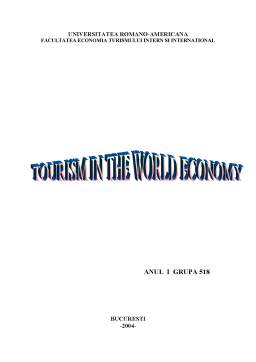Extras din referat
Studies of the role of tourism in the international economy are now beginning to appear in published sources, although “scientific” approaches to the study of tourism in individual countries date back to perhaps the beginning of the century.
These early works were largely concerned with the problems of statistical measurement which arise in any quantitative study of tourism, and made valuable contributions in this field.
The feasibility of studies of world tourist movements and international flows of resources consequent upon tourist development was clearly limited by an extreme paucity of information. Most recent studies have attempted to examine tourism on an international scale, and these rely heavily on data collected by the International Union of Official Travel Organisations in Geneva.
In the last years total international tourist expenditures are estimated to have grown at twelve per cent annum or almost twice the annual rate of growth of national incomes over the same period. Some reservations must be expressed about the quality of the data used in arriving at these estimates, but if the order of magnitude can be taken as broadly correct, tourism must now be recognised as an important activity both nationally and internationally.
The high growth rates are the result of continued expansion in national incomes in the developed countries combined with increasing leisure time for significant people.
These features mean that the income elasticity of demand for travel services in the developed countries tends to be very high.
Finally there has been a rapid expansion of charter-inclusive tour traffic, which multiplied nearly ten fold, on intra-European routes and showed substantial growth on other routes as well.
Although the majority of expenditures on tourism are still made within national boundaries, some 22 per cent of total tourist expenditures are estimated as being spent on foreign travel and, international tourism has also expanded rapidly.
There is no doubt that this expansion of international tourism and the demand conditions associated with it have suggested considerable potential for foreign exchange earnings to developing countries in general, particularly those who are located in a favourable position vis-à-vis the main tourist markets in Europe and North America. Many countries have recently introduced legislation to promote and facilitate foreign investment in the tourism industry.
Tourism has seemed attractive in view of the problems faced by many countries in expanding exports of “traditional” commodities and the high tariffs facing exports or manufactures.
Europe and North America have a dominant position in the international tourist business. In terms of developing countries, those of Europe and the Mediterranean have the major share, as might be expected from their general proximity to the more prosperous countries of Europe and their relative proximity to North America.
Although the Commonwealth Caribbean has a rather minor share of total receipts and arrivals, its position among developing countries outside Europe and the Mediterranean is quite significant, especially when considered against the relatively small population and land area of the region.
If one is interested in where the tourists come from in the different regions, it is necessary to distinguish between arrivals who come from within the region and those who are inter-regional, or come from outside the region as defined.
Similarly if one is interested in net flows of tourists and tourist receipts in different regions, it is necessary to distinguish between arrivals in a region and arrivals generated by that region.
In so far as inter-regional tourism is taken as being synonymous with “longhaul” tourism, it appears that North America is by far the most important net contributor to the longhaul tourist market, and Europe the most important net gainer. But the results of this analysis are highly dependent on the choice of region and the degree of disaggregation. For present purposes, it is important to distinguish between developed and developing countries.
From the point of view of the developing countries, the developed countries of Europe provide the greatest number of total inter-regional arrivals.
The developing countries themselves provide a substantial proportion of inter-regional arrivals, especially the developing countries of Europe and the Mediterranean.
Preview document
Conținut arhivă zip
- Tourism in the World Economy.doc


















